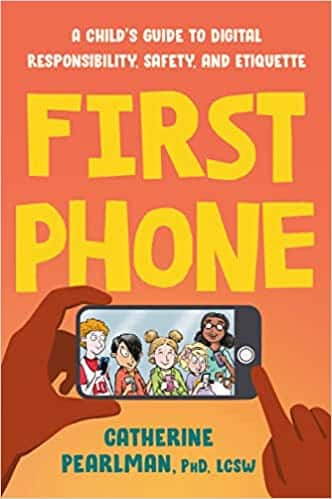Inside this post :Q&A with Dr. Catherine Pearlman, PhD, LCSW — Author of First Phone: A Child’s Guide to Digital Responsibility, Safety and Etiquette

Why do you think First Phone is important right now?
Smartphones and digital devices are a way life for our kids. We can’t just avoid screentime for as long as possible and hope for the best. Schools are increasingly requiring access to technology. With iPad and computers kids can access just about anything even before getting a smartphone. Plus, children are now socializing more and more in chatrooms online and in apps, even if they don’t have a phone.
That isn’t all bad news. There are so many incredible uses for these devices for both fun, education and to connect people. However, with all that access comes many concerns and dangers. Kids of all ages are susceptible to scammers and predators. There is more and more research coming out about the emotional impact of social media. And there is easy access to pornography and sexting. Even the most conscientious parents are finding it difficult to keep kids safe.
I wanted a resource that was written in a language for kids, but that could also be a guide for parents. When I realized there wasn’t a resource for tweens and teens that discussed digital etiquette, safety, self-care, social media, cyberbullying, sexting, sleep, smart googling, and scams/phishing I decided to write the book myself.
You feel strongly that kids (and adults) shouldn’t sleep with their phones. Why?
One of the statistics that surprised me the most while researching this book was that somewhere between 68%-80% (depending on the study) of kids sleep with their phones in their rooms. Of that group, 30% sleep with them on their pillows.
My concern is that we know from a great deal of research that when children, especially teens, do not get enough sleep or good quality sleep, there are serious ramifications, including more depression and anxiety, more disorganization and memory problems, more likely weight gain, and difficulty concentrating.
When teens sleep with their phones, they are up later, are interrupted all night long with notifications, and they have more time on screens overall. This makes for very tired kids who cannot cope easily with life’s struggles.
For this problem, there is a very simple solution: buy an alarm clock. Keeping phones out of bedrooms at night immediately helps children get more sleep, helps them disconnect from their screens in a more formal way, and prevents late-night texting and scrolling.
I promise you nothing good is happening in texting among teens in the middle of the night.
You have a chapter on self-care in a book about smartphones. Why is self-care so important for today’s teens?
Kids today, and especially teens, are under a great deal of stress. When I was a kid, I would go home after school, and I was pretty much off-duty in terms of my social life. I could relax and forget about whatever drama was happening at school.
Nowadays, this kind of social respite isn’t possible. Teens feel pressure to be connected all the time, which can take a toll. Additionally, social media, while lots of fun, can also have negative effects on teens’ mental health and self-esteem.
Imagine going through puberty with a body full of confusing daily changes only to look on social media to find only perfectly orchestrated lives with perfect-looking bodies and faces.
It’s rough. For the last decade, there is a disturbing increase in anxiety, depression, and suicidality in teens. One important way to help kids is to teach them to recognize that social media can be harmful, how to assess how it makes us feel, and how to take steps to improve our mental wellbeing when we need it most.
What is digital consent, and why should we teach it to kids?
Asking permission before sharing a picture or information about anyone is called digital consent.
We live in such a public world. Everything seems to be posted online. But sometimes posting can be taken too far in cases of cyberbullying, doxing (disclosing personal location and information), or it can make someone just uncomfortable.
Asking before posting should become the norm. This is basic digital kindness that should be required etiquette. And even if permission was granted, it should be acceptable to ask someone to take something down at any time.
That means kids may have no problem with your social media posts of the best vacation ever. But maybe in a few years they decide they would rather a picture not be on full display. Respect your kids’ boundaries and teach them to respect the boundaries of their peers.
At the end of your book you ask parents to be role models with their screen use. Is this really necessary?
The whole do as I say not as I do routine won’t work with digital devices.
Your children, and especially your teens, are watching you.
They are seeing what you post online, including images of them. They are seeing you engrossed in a text exchange when they are trying to tell you something. They see you sleeping with your phone. Children copy what they see.
So if you want your children to have good habits with their phones, then you need to show them you have good habits, too.
Follow the same rules of when to answer your phone and when to ignore it as your children.
I know this is no easy task. This is extremely hard on everyone because phones are built to be addicting. Programmers work long and hard to keep our attention.
But our kids also need our attention. Use apps and built-in screen time programs that encourage focus mode or family time.
What can parents do who feel like they have missed the boat on limiting screentime and social media or keeping phones out of the bedroom?
It is never too late to make a change of the rules and expectations in your home. Your teens may complain and whine. They may get angry.
But if you stay the course, if you make it a non-negotiable, they will accept the rules eventually.
About First Phone:
Cellphones have become a fact of life, with children as young as eight getting their very own “devices.” Such boundless access means our kids are in nearly constant contact with technology that was designed specifically for adults. And they’re doing so without any type of road map. Enter First Phone: the essential book that apprehensive parents can confidently hand to their kids to read as they begin their journey into the digital world.
In First Phone, Catherine Pearlman—licensed clinical social worker and parenting expert—speaks directly to eight- to twelve-year-old children about digital safety in a manner that is playful, engaging, and age-appropriate. With insights and strategies supported by the latest research, First Phone offers:
• guidance on privacy, boundaries, social media, and even sexting (yes, young children need to learn about sexting before it happens!)
• best digital hygiene and self-care practices, including when to put the darn phone down, when to turn off notifications, and where to charge
• how to be a kind and compassionate upstander in a digital world

When you are in the thick of raising teens and tweens, we recommend Loving Hard When They’re Hard to Love by Whitney Fleming. In Loving Hard When They’re Hard to Love, blogger Whitney Fleming shares her favorite essays about raising three teenagers in today’s chaotic world. Written from the perspective of a fellow parent, each story will leave you with tears in your eyes and hope in your heart because someone else is saying exactly what’s been going through your mind.

Parenting teens and tweens is hard. These popular posts may help you navigate these challenging times.
Six Of The Best Mindfulness Apps For Teens To Help Them Manage Life
Here Are The Tech Rules You Need To Be Setting For Your Tweens and Teens
The Unexpected But Genius Trick That Stopped Tech Battles With Our Teen
Talking About Porn With Teens Doesn’t Have To Be Hard
*This post contains affiliate links where we may earn commissions for items purchased from links on our site.






Leave a Comment